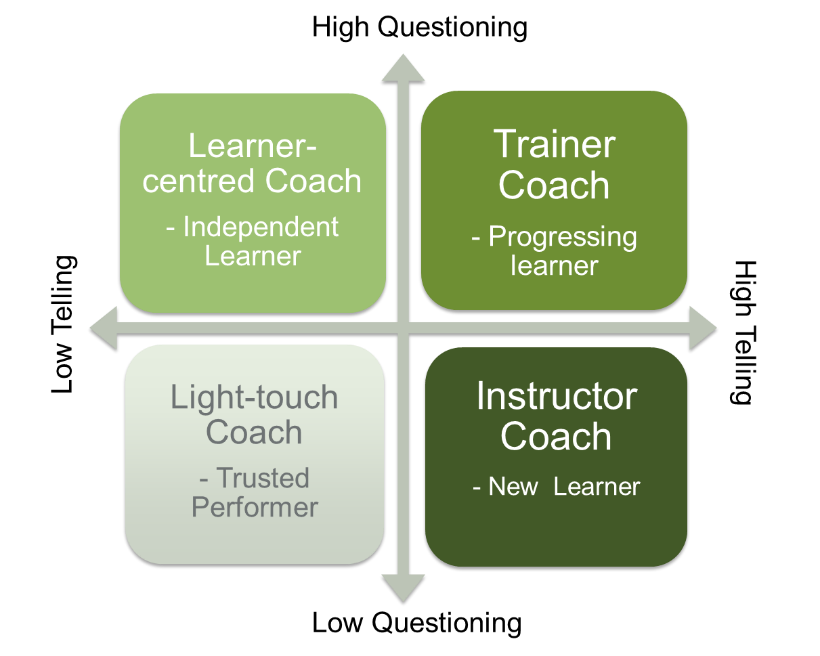By James Choles and George Barnes.
When thinking about coaching and delegation skills, I immediately think about how they can be used to manage priorities, which in turn can create growth opportunities. In fact, the ability to positively coach and delegate complement one another.
Long gone are the days when leaders and managers had all the answers, but there is still an expectation that they should. In such a complex and unpredictable environment, that is impossible. This is where coaching and delegating, as key skills for any manager and leader’s toolkit, come to the fore. Coaching really helps to unlock all the creativity and ideas to support change and organisational transformation. For organisations to be constantly learning and evolving to the ever-changing landscape, creativity and ideas need to come from every part of the organisation, not just the C-suite.
What’s needed when people transition into management is a mindset shift – they’re now responsible for delivering through others and helping their people grow and develop. Effective delegation is also a key part of this.
What does deligating mean?
Recent research from KPMG has shown that Senior Executives and Middle Managers are spending too much time either firefighting or on their day jobs and not enough on improvements and strategy.
This is seen more often with first-line managers who may be tempted to try and do things themselves (especially if they’ve been promoted for being very good at their old job). Now they find themselves leading a team of people that are doing the jobs that they used to do. It is difficult to pull back and say ‘No, my focus now is on delivering through the team rather than doing the job myself.’
In all these cases, whether you’re a senior, middle- or first-line manager, delegation is a really important tool to free up your time to focus on important issues, but ultimately to help your people grow and develop.
A key method to better encourage successful delegation is to inspire your managers/leaders to reflect on what their role means to them. Essentially, it is to be two things. One is to be spending a good amount of time focusing on the important longer-term strategic issues that are going to affect their organisation. And two, it’s to develop their people. It’s also easy to get dragged into the day-to-day urgent issues. Delegating is about stepping back and thinking about how you’re spending your time most effectively.

What and how to delegate
Ask yourself: what tasks would you hand over if you were about to go on annual leave? These are the ones you can probably delegate. Another way to decide what to delegate is to use the famous Eisenhower prioritisation matrix, which suggests that you should delegate urgent but not important tasks (i.e. things that might prevent you from achieving your longer-term goals).
Often people think delegation is a way to get people to do things that you don’t want to do, but it must be something that will positively challenge your people, help them grow and give them purpose. Also, think about the fit between the person and task – do they have the time, skills, experience, development potential, etc to make a success of it?
Setting clear expectations at the start is really important, and ideally should be co-created between you and the person you’re delegating to. This can include what they expect from you, the level of support needed and how often you’ll check in with the person. For example, you might need to be more direct with a newer member of staff whereas proven performers might be happier to be left alone.
Also, what do you expect from them? Although they’re responsible for the task, ultimately, you’re still accountable. You must both be invested in whatever you delegate to be a success – you cannot just get rid of the work. In all cases though, let people know that your door is always open if any issues arise – you both have a stake in this work getting done and getting done well!
Foundational to all forms of delegation is trust. You’re essentially saying to someone: ‘I know this is going to be a stretch for you, but I trust you and believe that you can do it. You can also count on my support whenever you need it.’
Manager as flexible coach
Once you’ve delegated a responsibility or piece of work, depending on the task and the person, they are going to need your support and you will need to have your coaching hat on. Here is where enhancing your coaching mindset can help.
To encourage you to do this effectively, Roffey Park Institute has developed the ‘Manager as Flexible Coach’ model. Coaching might be defined as working with another person on a one-to-one basis to help them fulfil their potential. But at different stages of their development, different people may need different coaching approaches. Some people might need a bit more instruction and some people might need more questions to draw their best performance out of them, for example.
Managers need to be able to flex their coaching styles depending on the circumstances. The model defines four coaching styles that may be needed at different stages of a person’s development. It is based on a varying mix of telling and questioning:

Some benefits of coaching
Coaching is a process that helps people to unlock ideas, encourage critical thinking and facilitate problem-solving skills. The power of a coaching conversation helps to reveal things that might otherwise remain hidden.
Think about the time when you have had managers that tell you to do things, whereas other managers might have asked you for your thought process, ‘How do you think we should do this?’ etc. Immediately this gives you a real sense of empowerment and confidence that your ideas matter and that your managers are interested in what you have to say. That can be really powerful in terms of building confidence.
Key aspects of coaching are to ask powerful open and positive questions, to listen intently and articulate what’s going on (‘I’m noticing that…’). It’s also important to stay out of judgement, and being curious is the best way of doing this. This is a much more powerful approach than just telling people what to do if they come to you with problems and that is difficult for managers and leaders.
It’s likely, for example, that if you’ve delegated something that’s a bit challenging, that’s going to stretch someone, they are going to face obstacles or challenges along the way. If you have a coaching mindset, you know you can have conversations with them – you can use powerful open questions.
In a complex and unpredictable world where no manager or leader can be expected to have all the answers, a coaching style approach also helps organisations to cope with disruptive change, eliciting fresh ideas and perspectives from across the business.

Delegating and leading vs delegating and coaching?
The key thing for managers and leaders here is to be able to flex the approach to the person and the situation. One size isn’t going to fit all. Even if someone is not hugely experienced, then a coaching approach can still be effective. Sometimes you might just need to tell them, but sometimes you might need to ask questions. Referencing the Roffey Park Institute ‘Manager as Flexible Coach’ model will offer sound guidance.
First-line managers, especially, might find this balance tricky to begin with and they won’t always get it right. And that is OK! Some advice would be that if you are not sure what your people need, just ask them. Another good tactic, if your people come to you with questions, is to say that you’re happy to share your ideas but are interested in exploring their thought process first. You can say something like: ‘I’m happy to share what I think you could do, but first, what ideas do you have? They might be better than mine!’
Challenges
Open conversations are very important, but they can also be one of the main challenges to successful coaching – it is quite time-consuming. When you have back-to-back meetings and urgent issues coming thick and fast, a major challenge is to be able to have the time to step back and have these important conversations. But you will see better results if you do make time for your people.
Many managers and leaders got to their positions by being good problem solvers. It can therefore be tempting, when a team member comes to them with an issue, to simply give advice or tell them how to fix the problem. But this isn’t helping them to develop. In the words of Michael Bungay Stanier, we need to ‘tame our advice monster’.
Daniel Goleman’s research has also shown that a coaching style of leadership was often resisted as it was thought to be too time-consuming when faced with urgent challenges. Finally, a coaching approach may make managers and leaders feel uncomfortable as it deprives them of one of their most familiar tools – asserting their authority.





